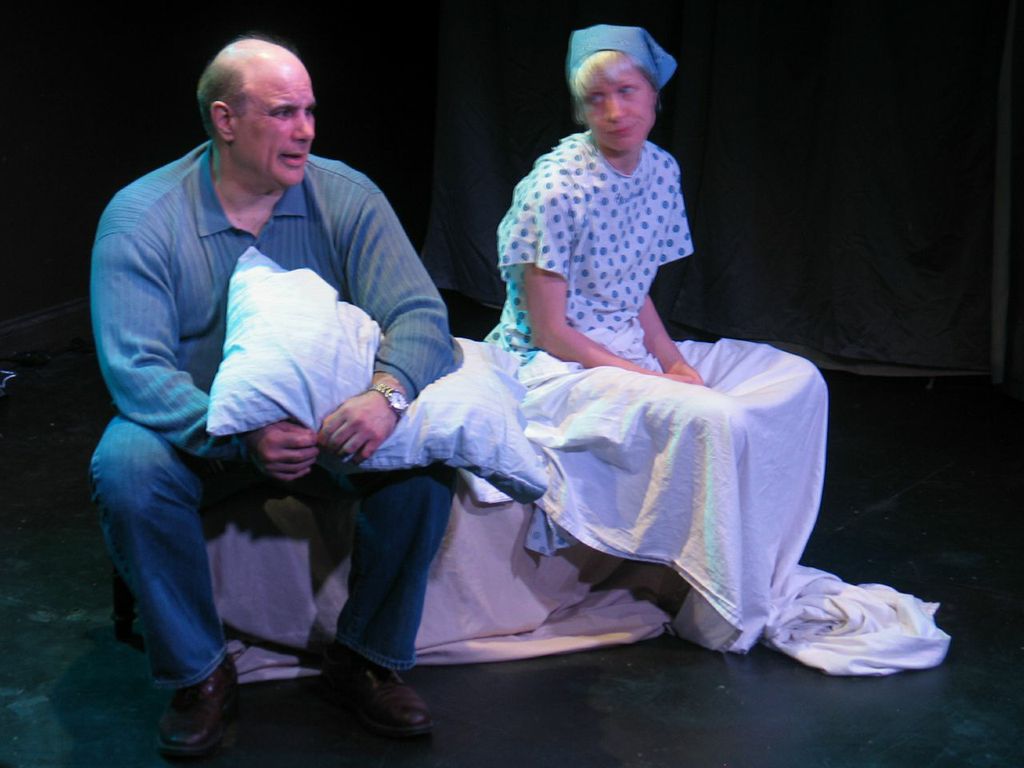 Watching Joseph Mosso’s “Selling Off Secrets†at this year’s Planet Connections Theatre Festival  is like dating a tease.
Watching Joseph Mosso’s “Selling Off Secrets†at this year’s Planet Connections Theatre Festival  is like dating a tease.
The play gives the audience no closure and lots of room for interpretation, for it is unclear at times whether a scene takes place in reality or in a character’s mind or memory.
Exploring how dementia affects the lives of the patient and those who care about her, the playwright allows the characters to confront each other without resolving their problems. They hear only what they want to hear and raise questions that no one answers. Had the play been longer, we would have had a chance to get to know more about the characters’ relationships and understand how the illness affected them.
However, all we can do in 40 minutes is to peek into the windows of the characters’ private lives and learn only some part of the story.
And in fact, since the play is quite short, it is even more frustrating that we never find out whose story this is. Is this the tragedy of Lanish (Tatyana Kot), a successful therapist whose mind was suddenly clouded by dementia? Unable to take care of herself (let alone her patients), she is bedridden in a mental hospital, while her husband, Martin (Peter Judd), sells her possessions in order to pay for her treatment.
From the couple’s brief conversation (which takes place in Martin’s imagination or dream) we understand that Lanish was the family’s provider, and that she remembers neither her husband nor her own name. She appears in Martin’s mind as a young woman in her wedding dress, and both her loss of memory and her helplessness pains him just as much as the fact that she reproaches him for selling her things while he’s doing his best to take care of her and pay her medical bills. This, of course, raises an important question about who suffers more: the person who gets sick, or the person who has to live with someone so changed and estranged, but we do not know enough about the characters or their relationship to answer it.
In addition, to make everything even more complicated, there appears James (Joseph Mosso), Lanish’s patient, who visits her in the hospital. Neither he nor she nor the audience knows the purpose of his visits; the conversation between the two consists of cursing one another, asking questions and responding to them vaguely. In a strange way, the relationship between James and Lanish seems closer than the one between her and her husband because they do not need to explain themselves to each other. Lanish talks to James calmly, like a therapist to a patient, and surprisingly, during their conversation she does not have trouble remembering either him or her husband. As a consequence, James, short-tempered and inconclusive, comes across as a better fit for mental hospital than she. Still, it is he, not Martin, who wheels Lanish into her room and promises to be there for her. When he sees her helplessness, he has tears in his eyes, which shows that despite all his cursing, he really cares about her.
And not only Mr. Mosso, but all the actors do a great job revealing who their characters are. For instance, Lanish is a strong woman, used to having control over herself and others, while Martin is a lonely man, who analyzes his behavior while trying to cope with his wife’s physical and emotional absence. He talks to the audience as though they were his friends or family, and he uses some humor, which brightens up his otherwise gloomy life. Martin’s sincerity makes his tragedy the most compelling, despite the fact that he lives off his wife’s earnings.
But even though we find the characters interesting and well-defined, we do not spend enough time with them to become invested in their lives. The most important secrets, it seems, are kept from us, and when the lights go down, the audience is confused, wondering whether this is an intermission or the end. And then the whole performance resembles a dream one does not want to let go of upon awakening.

Leave a Reply